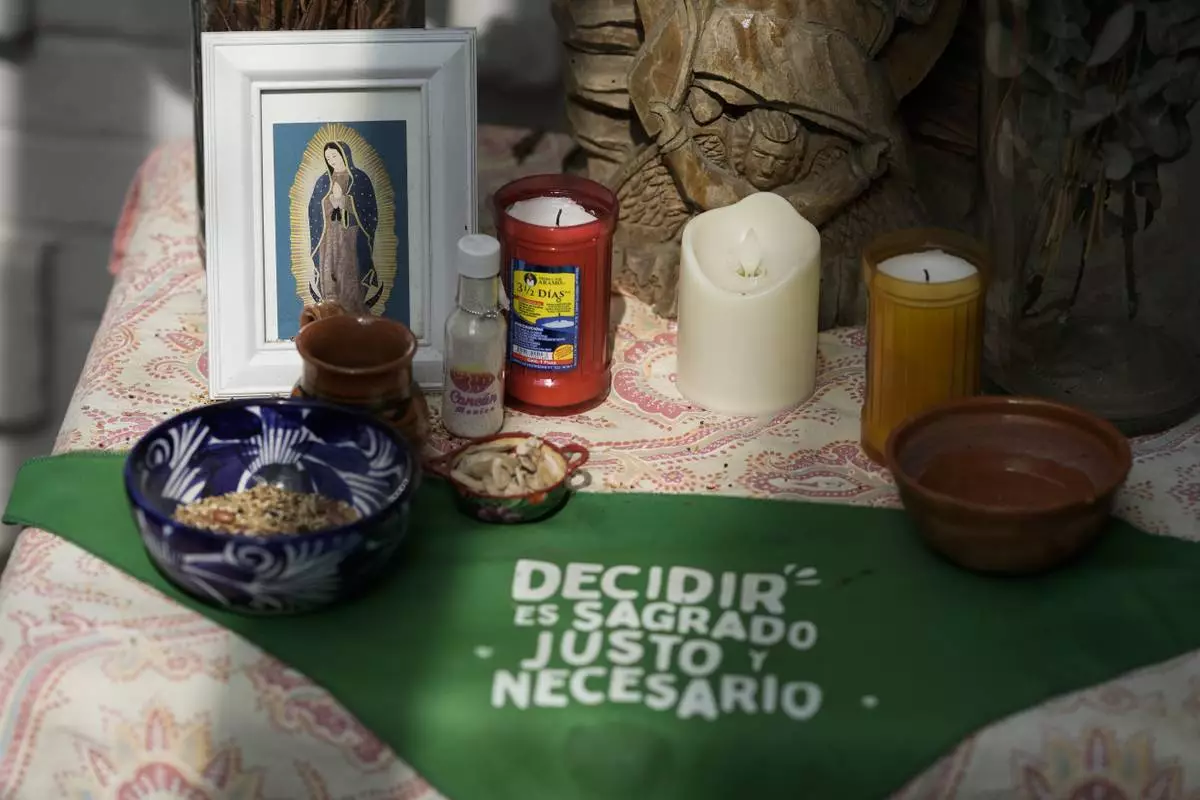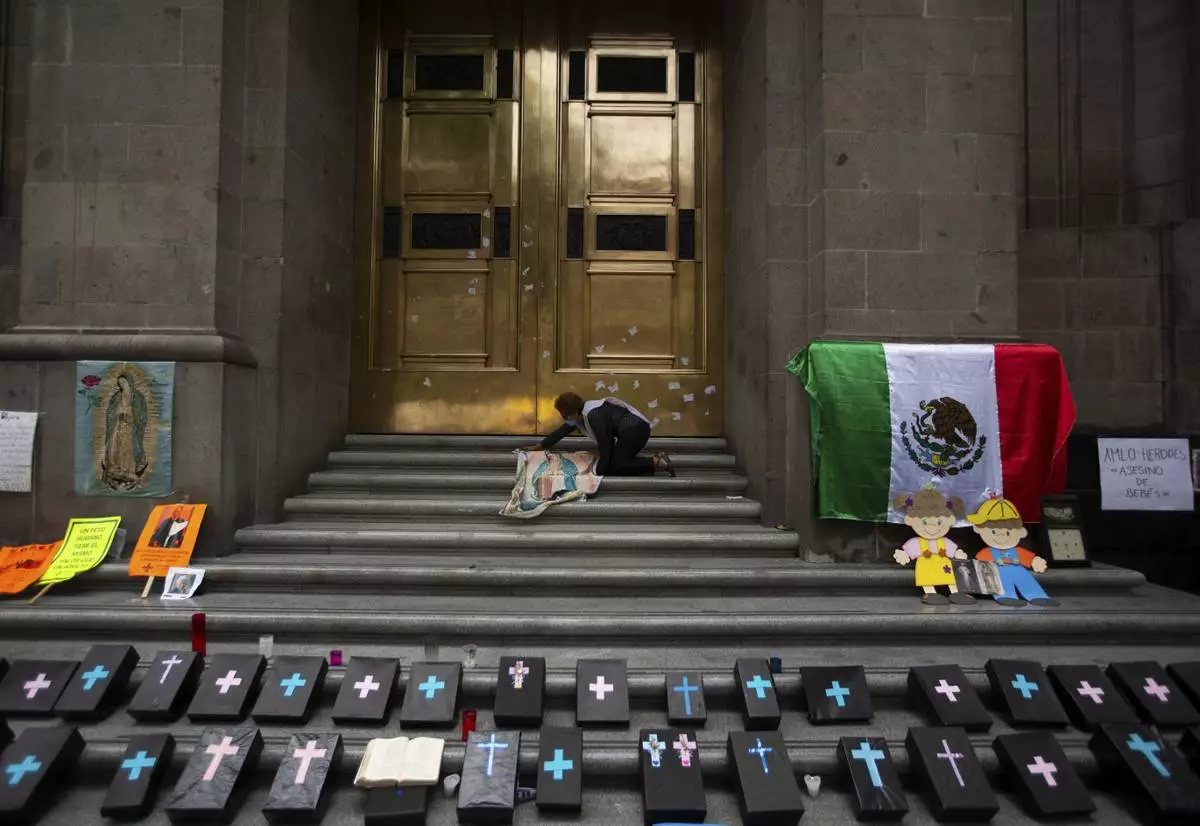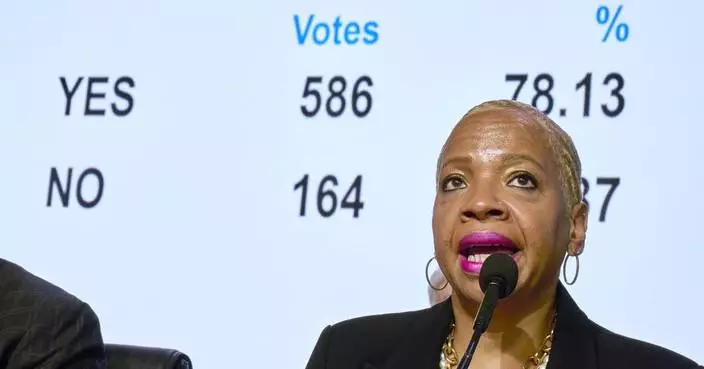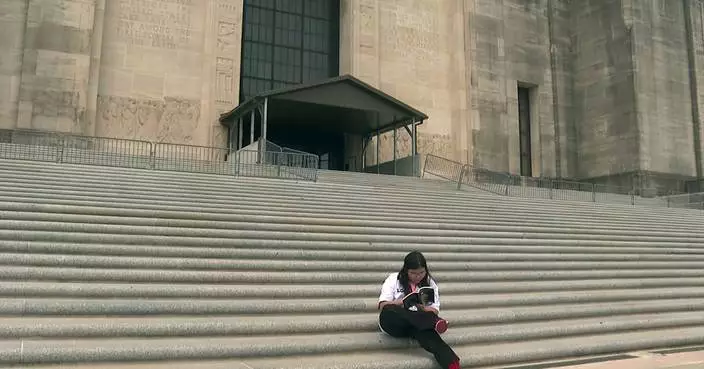Taiwan became the first place in Asia to allow same-sex marriage last week in a legislative vote.
Hundreds of same-sex couples in Taiwan have rushed to get married on the day a landmark decision to legalise same-sex marriage took effect.
Taiwan became the first place in Asia to allow same-sex marriage last week in a legislative vote on a cause that the island’s LGBT rights activists have championed for two decades.
A household registration office in central Taipei was packed as couples seized the earliest opportunity to tie the knot. Jubilant couples held flower bouquets and posed for photos, smiling and kissing.
“The legalisation of marriage is only the first step,” said a 48-year-old novelist who writes under the pen name Chen Hsue.
“In the future, through this legalisation, I hope LGBT people could be accepted as ordinary people by Taiwanese society,” said Ms Chen, who has lived with her partner for more than 10 years.
The Interior Ministry said 500 same-sex couples registered their marriages across the island on Friday.
A Taipei resident who identified himself only by a nickname said tearfully that he and his partner feel lucky they are able to announce in front of everyone that they are gay and have got married.
The two men wore matching pastel pink suits and stood in front of a rainbow display featuring messages blessing the newlyweds.
Several couples requested that their real names not be made public because they fear the stigma around being gay in Taiwan.
Kristin Huan, a YouTube blogger, said she and her partner Amber can strengthen other people’s faith and hope by sharing their story online.
“Coming out of the closet is a very difficult process for every gay person,” Ms Huan said.
Taiwan split from mainland China amid civil war in 1949, though China’s ruling Communist Party claims the island as part of its territory.
Same-sex marriage is not legal in mainland China, and while LGBT rights advocates have made progress over the years in raising awareness and promoting tolerance, depictions of same-sex relationships are still regularly censored on Chinese TV and social media.
MEXICO CITY (AP) — If a woman wins Mexico’s presidency on June 2, would she rule with gender in mind?
The question has been raised by academics, humans rights organizations and activists ahead of the voting that will likely elect Mexico’s first female president for the term 2024-2030.
Out of three candidates, the frontrunner is Claudia Sheinbaum, who has promised to keep President Andrés Manuel López Obrador's legacy on track. Next comes Xóchitl Gálvez, representing several opposition parties, one of which is historically conservative.
The triumph of Sheinbaum or Gálvez, however, would not guarantee their support for certain gender-related policies.
In a country of more than 98 million Catholics, neither of the two leading candidates has shared specific proposals on abortion. Both have suggested equality and protection measures for women amid a wave of violence and femicide.
Here’s a look at some of the challenges that Mexico’s next president would face regarding abortion and LGBTQ+ rights.
Twelve of Mexico’s 32 states have decriminalized abortion, most of them in the past five years. One more will join them after its legislature complies with a recent court's ruling, demanding a reform in its penal code.
A few more states allow abortion if the mother’s life is in danger, and it is legal nationwide if the pregnancy is the result of rape.
Mexico’s Supreme Court ruled in 2023 that national laws prohibiting abortions are unconstitutional and violate women’s rights. The ruling, which extended Latin America’s trend of widening abortion access, happened a year after the U.S. Supreme Court went in the opposite direction, overturning the 1973 ruling that established a nationwide right to abortion.
Although the Mexican ruling orders the removal of abortion from the federal penal code and requires federal health institutions to offer the procedure to anyone who requests it, further state-by-state legal work is pending to remove all penalties.
In most of the states where it has been decriminalized, abortion-rights activists say they face persistent challenges in trying to make abortion safe, accessible and government-funded.
To address restrictions and bans, dozens of volunteers — known as “acompañantes” — have developed a nationwide network to share information on self-managed medication abortions following guidelines established by the World Health Organization.
Whoever wins, the next president would not directly affect abortion legislation, since each state has autonomy over its penal code.
However, the president could indeed have an impact as a moral authority among the members of his or her party, said Ninde Molina, lawyer at Abortistas MX, an organization specializing in abortion litigation strategies.
“Much of the governors’ behavior emulates what the president does,” Molina said.
She among the activists who worry that neither Sheinbaum nor Galvez have shared specific proposals addressing abortion, LGBTQ+ rights and the protection of migrants.
“Such lukewarm proposals send the message that these are not fundamental rights,” Molina said.
And though she wouldn’t immediately worry about a setback on abortion policy, the scenario would change if López Obrador or Sheinbaum manage to get the approval of a judiciary reform aiming to replace the current judges with new ones elected by popular vote.
“The court is also in danger,” Molina said. “People may find this (electing the judges) attractive, but they don’t realize what it entails.”
If, for example, an abortion case reaches the Supreme Court and its current composition has changed, then a setback could indeed happen, Molina said.
Isaac Alonso, from Viva México Movement, which supported right-wing activist Eduardo Verástegui’ s presidential aspirations, thinks that neither Sheinbaum nor Gálvez represent Mexico’s conservative interests.
In his ranks, he said, no one is in favor of criminalizing women who have abortions. But since they firmly believe that abortion is unjustifiable, they would hope for government policies that encourage births through improvements in the adoption system.
Rodrigo Iván Cortés, director of the National Family Front, an anti-abortion group, said the current administration could not be considered an ally. “Before 2018, abortion had only been approved in Mexico City,” he said.
“It is very relevant to say how the Supreme Court, under the leadership of Arturo Saldívar, had an ideological bias,” said Cortés about a judge who currently advises Sheinbaum.
Still, he said, despite who wins the elections, his organization will continue “to take care of the first and fundamental of rights: life.”
“Just because a woman wins does not guarantee a gender perspective at all,” said Pauline Capdevielle, an academic from the National Autonomous University of Mexico.
“In fact, what we are seeing are strategies by conservative sectors to create a façade of feminism that opposes the feminist tradition.”
A true change, Capdevielle said, would start by integrating feminists into the government.
“It is not about putting women where there were none, but about politicizing these issues and really promoting a transformation.”
Some feminists have shown support for Sheinbaum, but both she and López Obrador have also received criticism for their lack of empathy towards women who protest against gender violence.
Amnesty International and other organizations have denounced excessive use of force against women during International Women’s Day protests and say that Mexican women’s right to protest has been stigmatized.
According to Capdevielle, some of the issues that need to be addressed in Mexico’s gender agenda are reproductive justice and women’s participation in political processes.
“The right to get an abortion must be consolidated,” she said. “It is far from being a reality for all women.”
Comprehensive sexual education, access to contraceptives and the rights of the LGBTQ+ community should be prioritized as well, Capdevielle said.
“The needs of this community are not likely to figure prominently in Mexico’s presidential elections,” said Cristian González Cabrera, senior researcher at Human Rights Watch.
Gay and transgender populations are regularly attacked and killed in Mexico, a nation marked by its “macho” culture and highly religious population. Human rights organization Letra S documented more than 500 homicides of LGBTQ+ people in the last six years, 58 of them in 2023.
The latest deaths came in 2024, with the murder of three members of the transgender community. This group, along with migrants, are particularly vulnerable to attacks, Gonzalez Cabrera said.
“LGBT migrants continue to suffer abuse from criminal groups and Mexican officials,” he said. “Too often, these human rights violations are not effectively investigated or punished.”
Sheinbaum said in 2023 that, as Mexico City’s mayor, she created a special unit for trans people and said that her dream would be to continue fighting on behalf of sexual diversity, but did not go into specifics.
As for Gálvez, she showed support for women “from the sexual diversity,” but also did not delve into specifics.
González Cabrera highlights that since 2022 all Mexican states recognize same-sex marriage, but some LGBTQ+ rights are not yet guaranteed nationwide.
“There are 11 states where the legal recognition of gender identity for trans people is not possible through administrative means, despite a Supreme Court’s ruling recognizing this right,” he said.
For there to be an agenda in favor of the LGBTQ+ population, González Cabrera said, a government should approach the communities’ organizations to learn about their needs, allocate resources to address violence based on sexual orientation and gender identity, support LGBTQ+ migrants and encourage local governments to align their legislation with the court’s rulings on their rights.
Associated Press religion coverage receives support through the AP’s collaboration with The Conversation US, with funding from Lilly Endowment Inc. The AP is solely responsible for this content.

FILE - A green scarf with a message that reads in Spanish: "To decide is sacred, just and necessary" adorns an altar to Our Lady of Guadalupe, in the office of the Catholics for the Right to Decide, in Mexico City, Dec. 4, 2023. Members of the organization denounce the invisibility of women in some religious environments and advocate for the reinterpretation of sacred texts with a feminist perspective. (AP Photo/Eduardo Verdugo, File)

FILE - An activist against abortion places a fabric panel of Our Lady of Guadalupe alongside small, mock coffins at the entrance to the Supreme Court to celebrate the court's decision against an injunction in Veracruz state that aimed to decriminalize abortion for all cases within the first 12 weeks of pregnancy, in Mexico City, July 29, 2020. In most of the Mexican states where abortion has been decriminalized, abortion-rights activists say they face persistent challenges in trying to make abortion safe, accessible and government-funded. (AP Photo/Fernando Llano)

FILE - Demonstrators march during a protest seeking justice over the death of magistrate Ociel Baena, the first openly nonbinary person in Latin America to hold a judicial position, in Mexico City, Nov. 13, 2023. Baena was found dead with their partner at home in the central Mexican city of Aguascalientes after receiving death threats because of gender identity, authorities said. (AP Photo/Eduardo Verdugo, File)

FILES - This combination of two file photos shows Xochitl Galvez, at left, arriving to register her name as a presidential candidate on July 4, 2023 in Mexico City, and at right, Claudia Sheinbaum at an event that presented her as her party's presidential nominee on Sept. 6, 2023 in Mexico City. In a country of more than 98 million Catholics, neither Galvez or Sheinbaum has shared specific proposals on abortion. (AP Photo/Fernando Llano, Files)

FILE - A woman holds a banner reading in Spanish, "Legal, safe, and free abortion" as abortion rights protesters demonstrate in front of the National Congress on the "Day for Decriminalization of Abortion in Latin America and the Caribbean," in Mexico City, Sept. 28, 2020. Mexico’s Supreme Court ruled in 2023 that national laws prohibiting abortions are unconstitutional and violate women’s rights. (AP Photo/Rebecca Blackwell, File)














